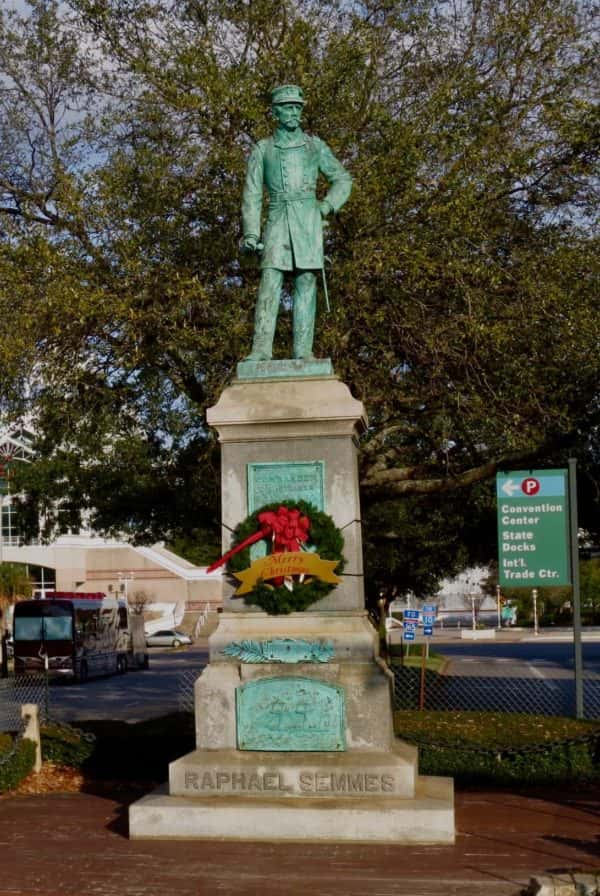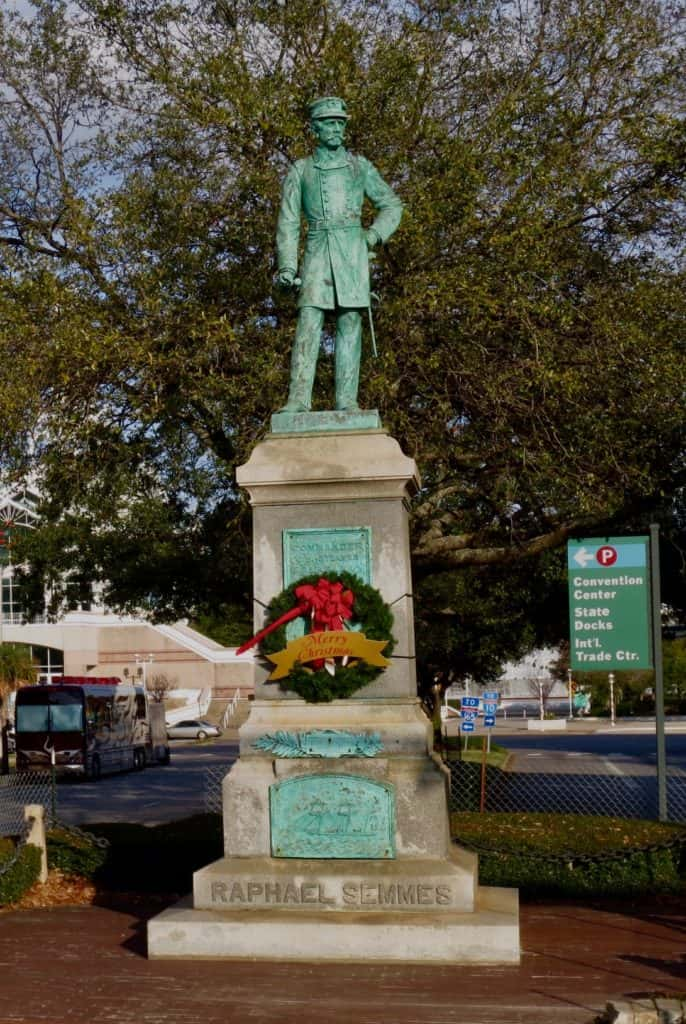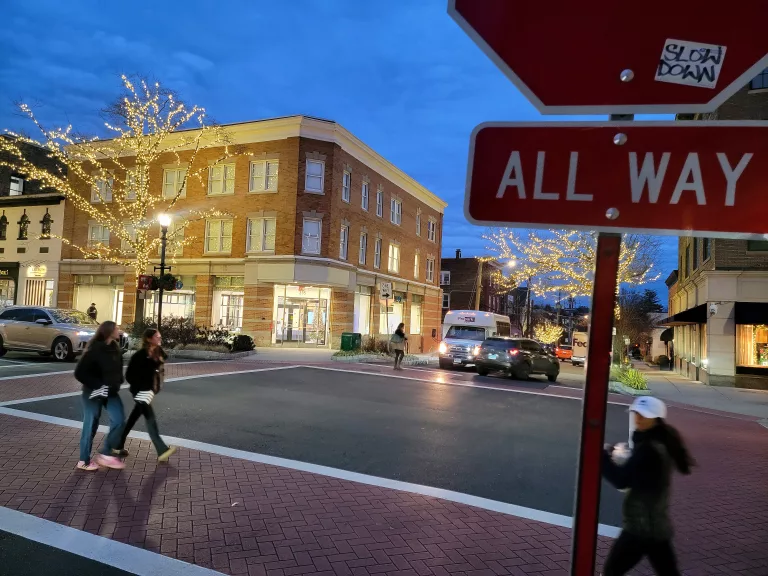
By Anne W. Semmes

In the early morning of June 5, the mayor of Mobile, Alabama removed the statue of my ancestor Admiral Raphael Semmes after its base was defaced in a recent protest. “This decision is not about Raphael Semmes, it is not about a monument and it is not an attempt to rewrite history,” said Mayor Sandy Stimpson.
But my ancestor, though a fabled one for his Confederate captaining of the CSS Alabama that would blaze a trail around the world capturing 66 merchant ships thus crippling the Union economy, was on the wrong side of the Civil War.
The news has properly gripped the widespread Semmes family. An email thread that engaged 70-plus Semmes relatives truly reflects the generational mindsets. Following on are excerpts – without names – excepting my Tennessee first cousin Anderson Humphreys, author of “Semmes America,” who broke the news to us all, “Alabama city removes Confederate statue without warning.” “History is under siege once again. Sad day.”
“History isn’t under siege,” replied a younger female niece from Texas, “and that language only serves to stoke the flames of a divisive rhetoric. This particular history is well preserved in museums and history books, where it belongs. It has no right to be honored and memorialized in this format and I, for one, am glad to see the statues removed. Let’s hope it stays that way.”
“My sentiments exactly,” wrote a California relative, “Statues are not history. It is time to come to grips with our national past, and as a country to not celebrate slavery and those who supported it… I am a direct descendant of Raphael Semmes who I respect in many ways. His maritime abilities both before and during the civil war are commendable. His writings and travels are illuminating. But his support of slavery to his dying day is wrong, very wrong. It should not be celebrated and in fact is a direct insult to black people.”
Another female niece from New Jersey was in agreement: “I am troubled by our family’s direct historical involvement in fighting for the right to own human beings, especially since I grew up in the South being proud of our ancestors…You are speaking for our family’s future. Thank you for that.”
“I totally disagree,” wrote a senior male Semmes. “Raphael Semmes was a man living in those times, with that environment, and the extant challenges. He was a brilliant, self-educated, man who was renowned throughout the world for his accomplishments, not the least of which was to be the cause of the first of Geneva conventions. His compassion is well established in his treatment of prisoners, respect for life, dealings with some mutinous sailors. Nothing good has ever been accomplished by hiding truth.”
But another male Tennessee cousin countered with: “Need I remind everybody about the lack of fairness and the folly of judging our ancestors by the laws enacted after their death and by the morality of today’s society. People who wish to condemn History should consider how their actions today will be judged by their great grandchildren… Because we today recognize that it [slavery] was wrong, does that mean that all humans before it was abolished were evil?”
“No, they weren’t evil,” responded a female relative. “It means we have evolved, and let’s celebrate that evolution, not the history. The history is for museums…and though I appreciate our amazing family history, it’s time to let go of old statues that make many people very upset, and see what comes in their place that can bring us unity, as a country, and in this case a family.”
“The Semmes family never asked for a statue, but the good people of Mobile did because of his service in the Seminole War/Mexican War/War Between the States,” wrote a great, great, great grandson of Raphael Semmes. “It’s not surprising that even my own family is confused on the facts…read his words and the words of other career military men of the time…they weren’t plantation owners … but loyal to their State and first and foremost military men committed to serving their neighbors against the economic oppression being executed by the Northern States.”
That brought a reaction from another male relative. Citing Raphael Semmes’ own words in his autobiography, “Memoirs of Service Afloat,” he shared. “He says the Civil War wasn’t a
‘moral crusade against slavery,’ but the government for which he was a servant and ‘hero’, directly contradicts him…Clearly, the city of Mobile believes that his lasting reputation as a defender of slavery outweighs the good will he had 150 years ago.”
“I choose to celebrate my other Semmes ancestors,” he continued, “I love my family, I’m proud to be a Semmes. I believe in our family heritage as American Heroes. Anderson, you gave me a copy of “Semmes America” when I was a child and it still has a place of prominence on my shelf. I am proud of the legacy that you have recorded for us. And I will always be thankful for the work you did. The Semmes history doesn’t begin and end with Raphael Semmes.”
Another great, great, great grandson chimed in. “I live in the south. I see the vestiges of slavery almost daily. I will make no apologies for it nor for my ancestors (or anybody else’s) who participated in it. I don’t claim to be ‘woke’ or progressive or anything like that. But I do know that many black people were exploited by slavery and I do know that many white people benefitted from that exploitation. My name is Raphael Semmes and I’m proud of that. But romanticizing the past is not the best way forward.”
A young Semmes cousin who sees his ancestor in a broad historical context wrote first he is not offended by the removal of the statue of his ancestor. “Raphael Semmes was an unequivocal hero to my grandfather, United States Navy Vice Admiral Benedict Joseph Semmes and it has been important to my father for me to know that history. His naval achievements undoubtedly influenced future Semmes’ to be self-advocates, think outside-the-box military, and defy establishment odds and expectations.”
As to that heralded history of Raphael Semmes and CSS Alabama around the world, my young cousin related, “He was most notably considered a folk-hero in Cape Town, South Africa, after living up to his daring reputation and averting/sinking a Union ship, while sailing into harbor. Though it is not explored in the Oct 10, 1863, Illustrated London News article detailing his arrival in Cape Town, I suspect that the hundreds who cheered his arrival were not the emancipated South African slaves still living under oppressive conditions, indentured servants to a society of white supremacy.
“If it [the statue] were in a museum, presented in context, perhaps the Admiral’s story would shine through,” he writes, but from its perch in Mobile, “it was only serving as a blatant reminder of a lost cause.”
“For the record,” my young cousin concluded, “It is clear from ‘Memoirs of Service Afloat’ that Raphael Semmes believed that the institution of slavery ‘stood upon moral and religious ground alone.’ Slavery has never been ‘moral.’ Most of our Founding Fathers knew this when the country was founded, yet they continued to ‘kick the can down the road,’ for too many reasons to name here now.”
That Semmes family thread appeared to have ended last week until my New Jersey niece just emailed her new findings of the forces that had brought forth these Confederate monuments, especially in the South. “Two distinct periods saw a significant rise in the dedication of monuments and other symbols,” she wrote. The first was around 1900, the arrival time of the Semmes statue, “amid the period in which states were enacting Jim Crow laws to disenfranchise the newly freed African Americans and re-segregate society…The second spike began in the early 1950s and lasted through the 1960s, as the civil rights movement led to a backlash among segregationists.
“If more Americans are seeing Confederate monuments differently as they wake up about police violence against blacks and other systemic forms of racism,” she emailed, “I think it is for the greater good. Nothing will change the fact that Raphael Semmes was courageous and brilliant. Such remembrance does not have to be in the form of a public monument that also applauds the Confederate cause for slavery-based prosperity.”





